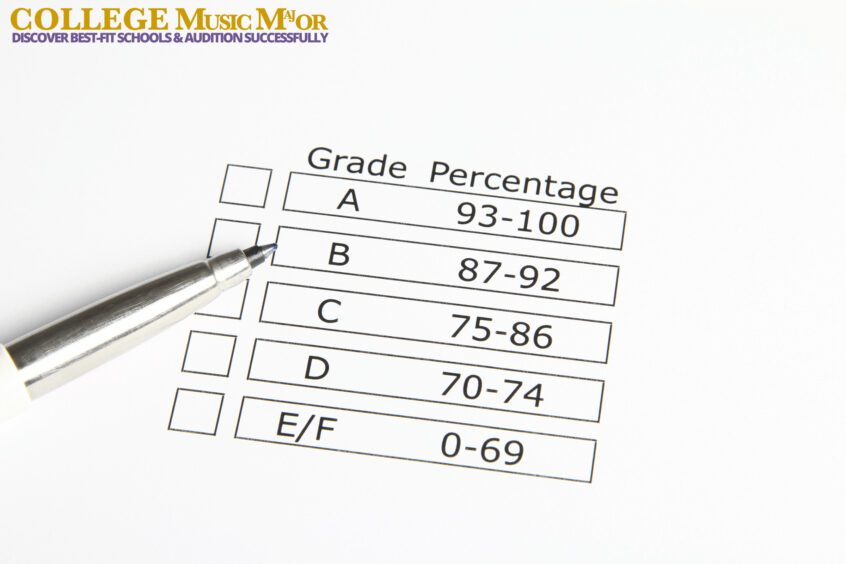Admission to a music college can be a complicated process that takes into account a number of factors. One of the factors that often comes under scrutiny is academic performance and Grade Point Average (GPA). Aspiring musicians along with their parents often wonder about the significance of GPA in getting admission to a music school. This article aims to provide guidance and clarity on this topic.
Understanding the Role of GPA in Admissions
Good grades are indeed important. A National Association for College Admissions Counseling survey indicates that over 70% of participating college admissions offices ranked “grades in all courses” and “grades in college prep courses” as top factors in their decision-making process.
However, the answer is not as simple as having an excellent GPA. Context matters, and the coursework represented by the GPA is equally important. University of Virginia admissions dean Jeannine Lalonde emphasizes that the GPA doesn’t tell the full academic story of an applicant. The actual courses and grades on the transcript provide a more comprehensive understanding of a student’s academic strength.
GPA Considerations in Independent Music Schools
Independent music conservatories such as New England Conservatory, Juilliard, and Berklee have unique stances on GPA. For instance, Juilliard’s official stance states that no specific courses, GPAs, or class rank are required for admission. Instead, they carefully evaluate transcripts and diplomas earned by applicants. This approach is similar across many independent conservatories. The most important factor tends to be the audition, followed by other essential items, including pre-screening recording, resume, college essay, recommendation letters, and at some schools, the interview.
That being said, an impressive GPA can signify to these schools a certain level of diligence in your work ethic. So, while not a determining factor, having a good GPA can positively influence your application.
GPA Considerations in University-Attached Conservatories
Universities with music schools attached, like Northwestern University or the University of Michigan, often care about students with a competitive GPA. However, the GPA requirements for these music schools are often not as high as those required for liberal arts programs within the same universities.

For example, the University of Michigan, an academically competitive school with a top music program, has an average GPA of 3.87 for its programs across all departments. However, for its music school, the average is a 3.67 GPA, which translates into a 91.7% average, solidly A-.
The takeaway here is that an A- average is neither necessary nor sufficient for some music university-attached conservatories. What is more important is a strong audition and maintaining a balance between academic and musical commitments, as highlighted by a post on College Confidential.
Balancing Academic Achievements and Musical Excellence
It’s important to remember that no matter how good your academic stats are, you need to pass the audition for music school admission. As an example, a student who dedicated all his efforts to achieving high grades and SAT scores found himself rejected by all the music programs he applied to as his musical abilities fell behind due to lack of practice time.
Success in music school admissions is about finding the right balance. High academic standards can help you get into the university but won’t help you secure a spot in the music school if you can’t pass the audition.
Berklee College of Music Admissions
Looking at specific music colleges can give us a better perspective. For instance, Berklee College of Music has an acceptance rate of 51.4%. This indicates that the school is moderately selective, and while it expects students to meet their GPA and SAT/ACT scores requirements, they are more flexible than other schools.
The average GPA at Berklee College of Music is 3, indicating that Berklee accepts below-average students. It’s perfectly fine to be a B-average student, with some A’s mixed in, but avoiding C’s and D’s is advisable. If your GPA is at or below the school average of 3, a higher SAT or ACT score can compensate and increase your competitiveness against other applicants.
Conclusion
In conclusion, GPA does play a role in music school admissions, but its importance varies depending on the type of school – independent conservatories or university-attached programs. While a high GPA can boost your application, it’s not the be-all and end-all. Other factors like your audition performance, coursework, extracurricular activities, and recommendation letters are equally, if not more, important in the admission process. So, keep practicing, stay focused, and strive for balance in your academic and musical pursuits to maximize your chances of getting admitted to your dream music school.
About the Author

Dr. David Lee Fish
Dr. David Lee Fish, Ph.D. is the founder of College Music Major. A veteran figure in music and education whose extensive career spans decades, he's known for his unique approach to music and for sharing his passion with others. His expertise ranges from performance and songwriting to education and private consulting.

